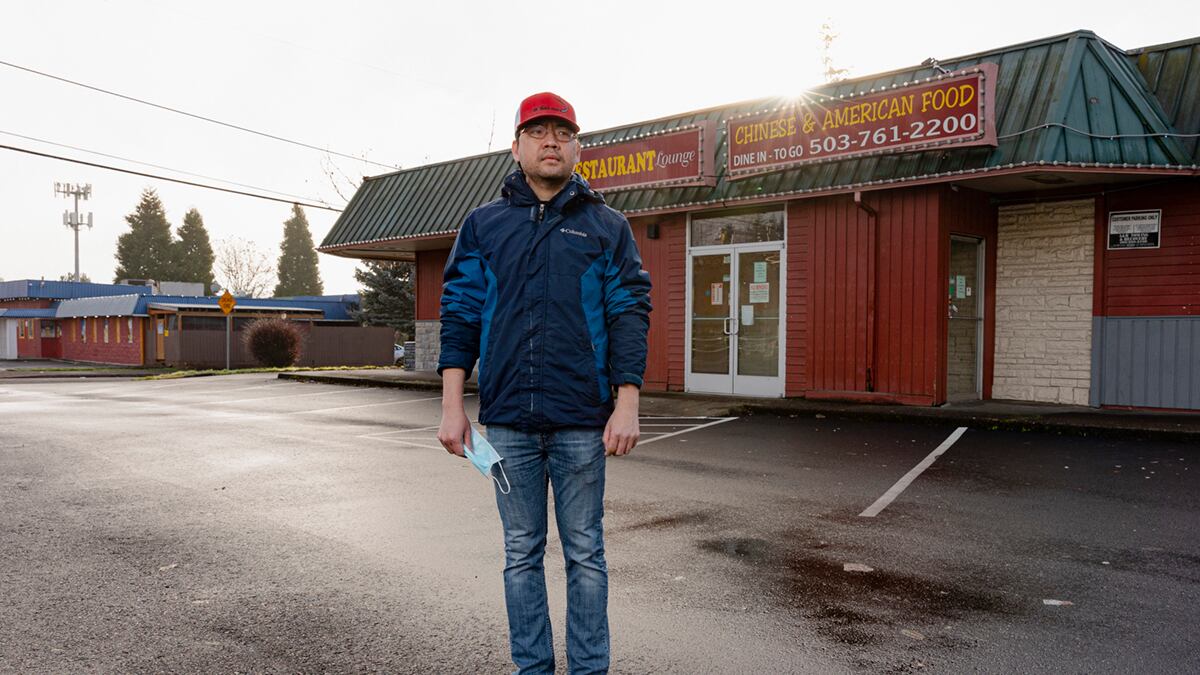On Nov. 18, John Ma closed Vegas Chinese Restaurant.
For the second time in a year, Gov. Kate Brown had shuttered restaurant dining rooms across Oregon. That left Ma the option of serving customers takeout boxes of fried rice and kung pao chicken—either in the restaurant lobby or the parking lot of a shopping plaza on the corner of Southeast Division Street and 125th Avenue.
Ma says those options don't work: Without alcohol sales in the bar, he can't turn a profit on his current takeout volume. He sees one possible salvation: a drive-thru window.
"I've invested $230,000 into this business. I like having my business, it is my life," he tells WW in Cantonese through a translator. "A drive-thru window is more safe for people and for the business. Taco Bell has good business with a drive-thru window."
Since June 16, he's been asking Portland development services officials to let him install one. They've said no.
Ma's lifeline conflicts with the city's climate goals.

In 2018, the Portland City Council voted to ban the construction of new drive-thrus in commercial zones to reduce carbon emissions from idling cars and improve walking safety on city streets. The brunt of this rule falls east of 82nd Avenue, where the preponderance of the city's commercial zones lie.
All over Portland, a city that professes to loathe cars is finding them newly useful in the COVID-19 pandemic. Businesses from Lucky Devil Strip Club to Shine Distillery and Grill have pivoted to drive-thru models. Their improvised drive-thrus are allowed while Vegas Chinese Restaurant's request is rejected because they don't require modifications to their buildings—so they don't need a city permit.
Yet the end product is the same: Both kinds of drive-thrus result in idling cars spewing greenhouse gases while drivers wait for their orders.
Arlene Kimura, land use chair for the Hazelwood Neighborhood Association, agrees that climate change is a real issue that needs to be addressed. But she wonders why the city hasn't modified its rules so a first-generation immigrant can keep his business afloat.
"If [Portland has] outdoor dining and you could move your restaurant's seats outside into the parking area," Kimura says, "there's no reason why they could not permit a temporary drive-thru for pickup."
The city's Bureau of Planning and Sustainability is one of three city departments that either rejected Ma's appeal or has a rule against his request along with Portland Bureau of Transportation and the Bureau of Development Services. BPS spokesperson Eden Dabbs says limiting drive-thrus is crucial to slowing climate change.
"I understand businesses are really hurting right now. It's tragic collateral damage," Dabbs says. "They're just not allowed anymore. It's for pedestrian safety. It's also a climate issue. It's kind of a bummer."
PBOT offered Ma two alternatives to a drive-thru window: a designated parking spot in the parking lot for food pickup and outdoor seating.
Ma says neither of those provide the volume he needs to replace the closing of the barroom at Vegas Chinese Restaurant. "I don't want outdoor seating because of the lack of security," he adds. His business is located next to Division, a busy, four-lane main drag.
Spokesperson Dylan Rivera says PBOT has worked with organizations that want to distribute goods outdoors. The bureau helped the Salvation Army, for example, use an entire parking lot at Lloyd Center for a weekly food box giveaway on Monday mornings starting back in May.
"Basically, if people are not driving up to a window of a building in their cars and getting a service, such as fast food or items from Salvation Army, then it is not a drive-thru and very likely would not require a permit," Rivera wrote in an email. "It is just a change in operations and how the business uses the parking lot."
In other words, city bureaus don't trust that Ma's plan is temporary—and they aren't willing to approve installation of a permanent new car-centric feature on his business.
Neighborhoods east of 82nd Avenue are among the places in Portland hit hardest by the pandemic. They are also some of the most car-dependent in the city—which means struggling businesses there could protect employees and get an economic cushion by installing drive-thru windows.
Kimura says the business community in outer East Portland is often overlooked, which is particularly harmful during COVID. When PBOT issued permits this summer for dining areas in parking lots, on sidewalks and in parking spots, for example, only seven businesses east of 82nd took advantage of the program.
Kimura also mentioned how East Portland businesses have to compete for COVID-19 funding with other, more sophisticated parts of town that speak English because "they do not fit into the corporate model that makes is simpler for bureau employees to work with."
"People don't want to get creative in East Portland because that's the low-rent district, so why should we bother? It becomes a frustration for our business community," Kimura adds. "A lot of us are small; we're just trying to keep afloat."
City Commissioner Chloe Eudaly, who oversees transportation, didn't respond to WW's requests for comment.
Ma's quest for a drive-thru appears to be a lonely one. City officials said they weren't aware of any other permit applications to install a drive-thru since the pandemic began. Neither was the Oregon Restaurant & Lodging Association.
Ma looks across his parking lot a block west and sees a Burger King, which has closed its lobby and now serves all its Whoppers out of a drive-thru window. That fast food joint was grandfathered into the city's rules because it operated its drive-thru window before the ban was enacted.
"I am waiting to see what happens after the freeze is over, and I will reconsider my options," Ma says. "I'm scared I am going to lose my business."

